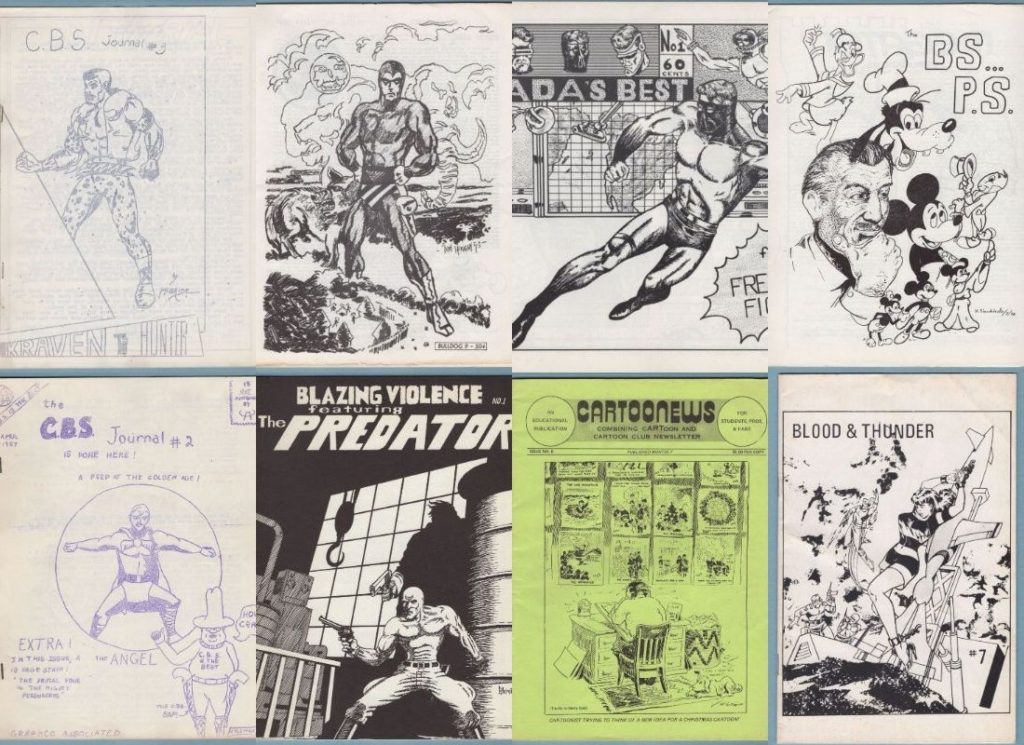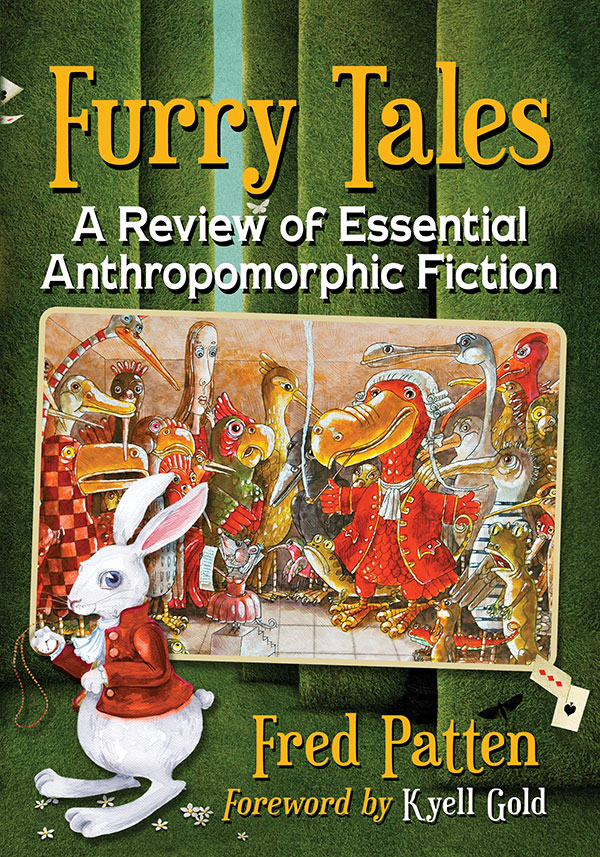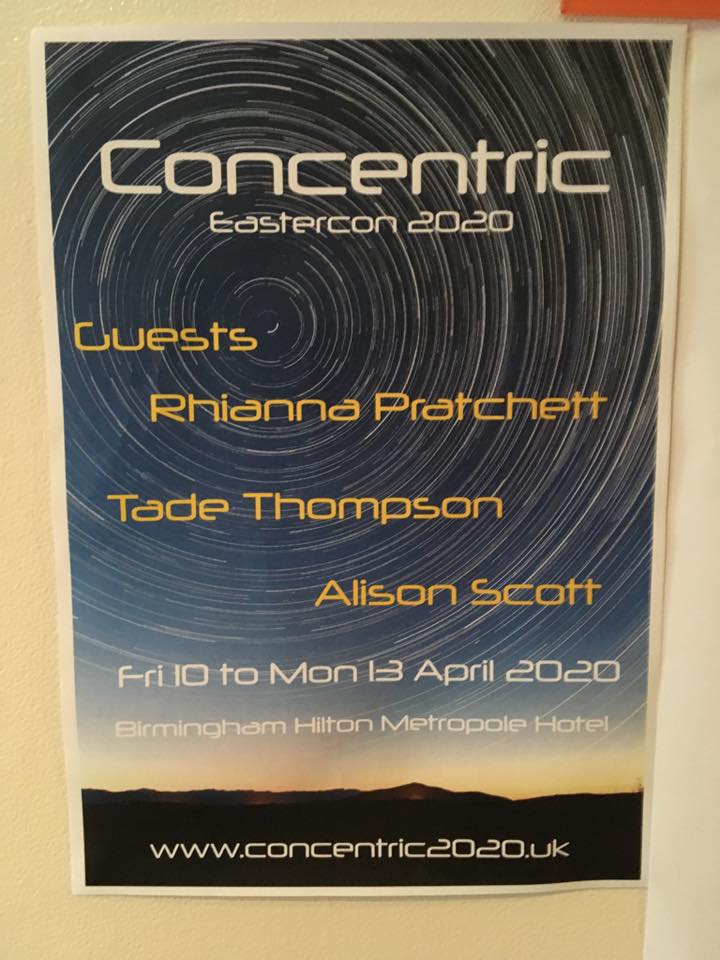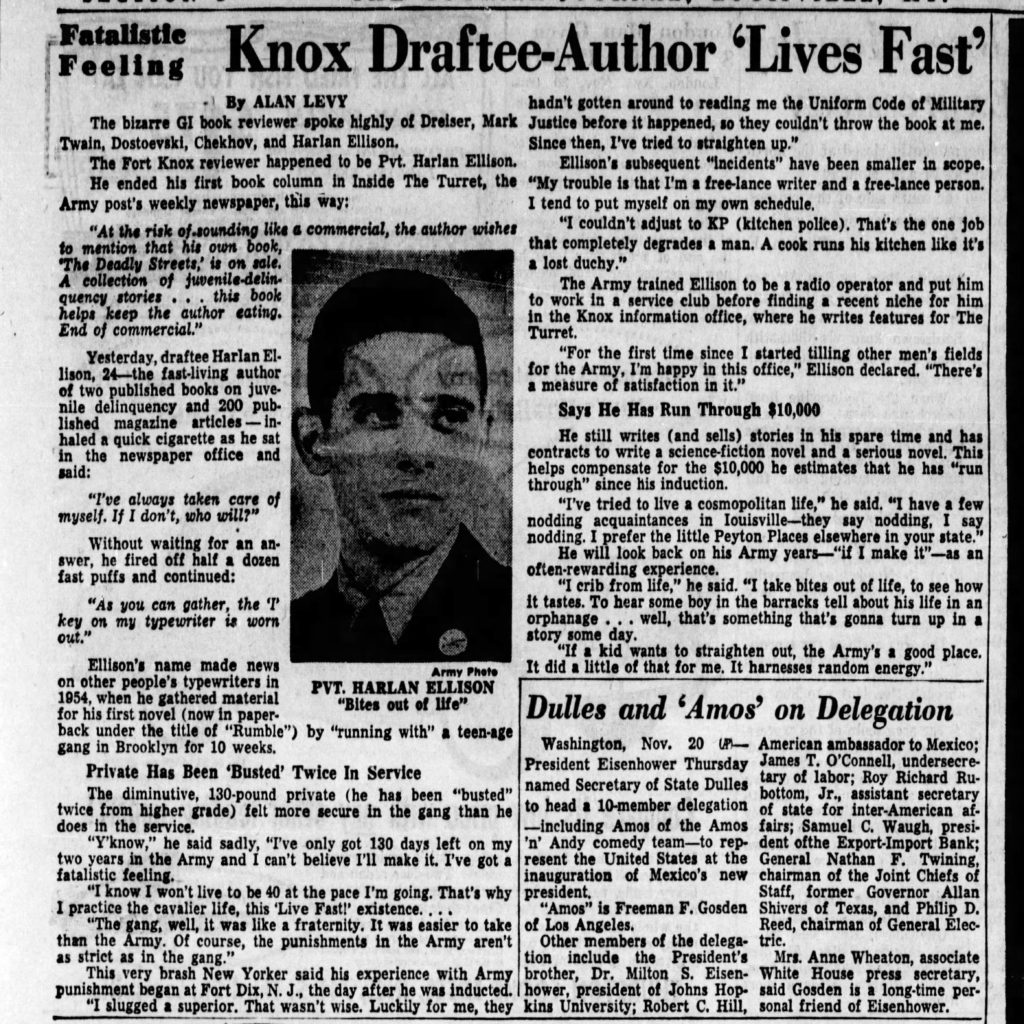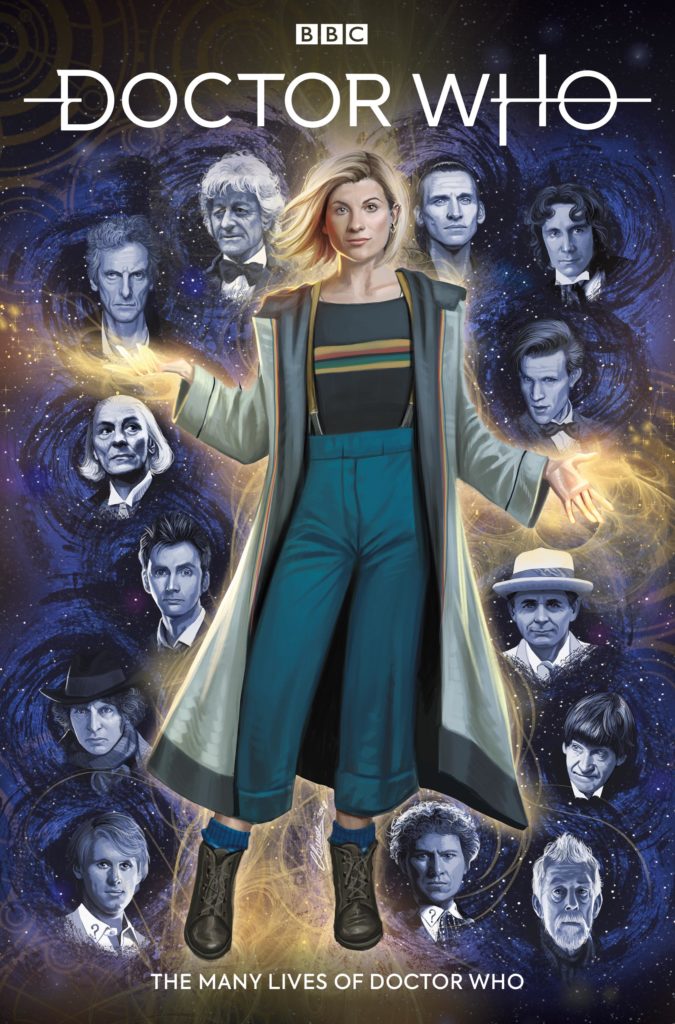(1) STABBY VOTING. Reddit’s r/Fantasy forum hasopened voting for the Stabby Awards. They’ve suffered voting shenanigans in the past, too, and here’s what they’ve done to stop them —
It’s now time to vote for the /r/Fantasy Best of 2019 Stabby Awards. Due to the sub’s growth over the past year (from the time that the nomination thread went live to now, we’ve grown by over 8,000 subscribers!) and to issues we experienced with vote gaming last year, voting will be taking place off Reddit.
We’re using a Google Form (same as we’ve used for our demographic census for years) and in order to vote you’ll need to include a link to your own user profile. Profiles will need to be at least 1 month old for their votes to count – we chose this cutoff to ensure that folks who created accounts solely to nominate and thus aren’t really part of our community aren’t going to affect the results.
…Voting will end January 4, 2019 at 9 p.m. PST. Results should be live by January 6, 2019 by 1 p.m. PST.
(2) SPARKS TOO MUCH JOY? In The Guardian‘s “It’s ‘Day of the Triffids’ for today’s Britain, but with antidepressants as the monster”, critic Vanessa Thorpe analyzes the filmmaker’s challenge:
…An award-winning science-fiction thriller billed by critics as a modern Day of the Triffids takes a provocative approach to Britain’s growing dependence on mood-lifting chemicals and antidepressants.
Little Joe, released in UK cinemas in February, and starring Ben Whishaw, Emily Beecham and Kerry Fox, has divided reviewers with its odd, disturbing story of a newly bred plant designed to spread joy.
On set in a vast greenhouse laboratory, the acclaimed Austrian director Jessica Hausner first told her actors to forget about finding “the truth” of their characters.
“Little Joe looks at the question of how do you perceive whether someone has changed or not,” Hausner told the Observer. “That was the big issue when I talked to the actors. And so even when we were shooting, we were shooting different versions of each scene.”
(3) ENDANGERED BY IDEAS. Maria Popova tells “How Kepler Invented Science Fiction and Defended His Mother in a Witchcraft Trial While Revolutionizing Our Understanding of the Universe” at Brain Pickings.
…In the anxious winter of 1617, unfigurative wheels are turning beneath Johannes Kepler as he hastens to his mother’s witchcraft trial. For this long journey by horse and carriage, Kepler has packed a battered copy of Dialogue on Ancient and Modern Music by Vincenzo Galilei, his sometime friend Galileo’s father — one of the era’s most influential treatises on music, a subject that always enchanted Kepler as much as mathematics, perhaps because he never saw the two as separate. Three years later, he would draw on it in composing his own groundbreaking book The Harmony of the World, in which he would formulate his third and final law of planetary motion, known as the harmonic law — his exquisite discovery, twenty-two years in the making, of the proportional link between a planet’s orbital period and the length of the axis of its orbit. It would help compute, for the first time, the distance of the planets from the sun — the measure of the heavens in an era when the Solar System was thought to be all there was.
As Kepler is galloping through the German countryside to prevent his mother’s execution, the Inquisition in Rome is about to declare the claim of Earth’s motion heretical — a heresy punishable by death….
(4) NOT MUSED. “And it occurs to me that this is disrespectful to the Nine” at It’s Always More Complicated, (a post inspired by Anne Bilson’s piece for The Guardian, “Anna Karina, Catherine Deneuve: how movies malign women by calling them muses”.)
…But is this view of the Muse, who is after all a goddess, a being at whose feet the artist is supposed to lay the offering of the art created in order that she may judge it worthy, not very disrespectful? In assuming that the muse is just some empty thing to fill up with M. L’Artiste’s (and it is M., is it not) geeenyus?
François Truffaut once said of Catherine Deneuve: “I wouldn’t compare her to a flower or a bouquet, since there is a certain neutrality in her that leads me to compare her to the vase in which all the flowers are placed.” He meant that her reserve and air of mystery enabled spectators to “fill the vase” themselves; but the history of male film directors and their female muses is also a history of vase-filling: men translating their erotic fantasies into cinematic terms while failing to get to grips with the women themselves, who are invariably depicted as quixotic and inscrutable, even dangerous.
Not that I am sure which of the Nine would be the muse of movies – or would it vary by specific genre?
(5) BLUE GENES. Cora Buhlert presents “The 2019 Darth Vader Parenthood Award for Outstandingly Horrible Fictional Parents”.
… Let’s have a bit of background: I have been informally awarding the Darth Vader Parenthood Award since sometime in the 1980s with the earliest awards being retroactive. Over the years, the list of winners migrated from a handwritten page via various computer file formats, updated every year. Last year, I finally decided to make the winners public on the Internet, because what’s an award without some publicity and a ceremony? The list of previous winners (in PDF format) up to 2017 may be found here, BTW, and the 2018 winner was announced here.
In 2017 and 2018, a clear frontrunner emerged early on. 2019 was different, because there were several likely and unlikely candidates.
Warning: Spoilers for several of things including The Rise of Skywalker behind the cut…
(6) THE MOST OF BABY YODA. You wouldn’t want to miss this! (Well, some of you would, but your loss!)
BABY YODA from The Mandalorian season 1. Best of Baby Yoda taken from episodes 1 to 8 of The Mandalorian….
(7) GRAY OBIT. Scots author Alasdair Gray died December 29 at the age of 85. His publisher, Canongate, posted this retrospective:
A renowned polymath, Alasdair Gray was beloved equally for his writing and art. His debut, Lanark, which Canongate published in 1981, is widely regarded as being one of the masterpieces of twentieth century fiction. It was followed by more than thirty further books, all of which he designed and illustrated, ranging from novels, short story collections, plays, volumes of poetry, works of non-fiction and translations – most recently, his interpretation of Dante’s Divine Trilogy.
The Guardian’s tribute said he “blazed a trail for contemporary Scottish fiction with his experimental novels.”
In 1954, Gray began writing the novel that would occupy him on and off throughout the 1960s and 70s. Lanark divides the story of a life into four books, alternating between Glasgow and a shadowy version of the city called Unthank. The novel opens with book three, in which a young man finds himself in a dark metropolis filled with strange diseases, and then jumps back to fill in the story of Duncan Thaw, who grows up in Glasgow just before the second world war. The Guardian called it “fluent, imaginative”, a novel “of undeniable quality, but rare, and not for all tastes, like an oyster, or a truffle”.
He made an indelible impression on both the literary and fannish worlds. Alasdair Gray and Russell Hoban were the guests of honor at the first Mexicon (1984) in the UK. As David Langford recalls, he made ink sketches of various fans there, and his “[John] Brosnan drawing is inscribed: ‘The Author of Slimer, a seminal work which has influenced everything I have ever written.”
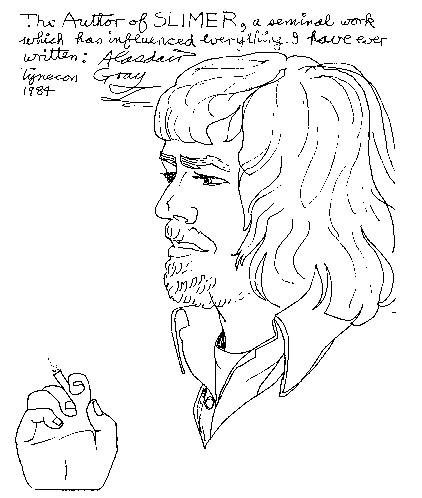
(8) WOLLEN OBIT. Peter Wollen (1938-2019), author of the influential film theory book Signs and Meaning in the Cinema, who also directed films and wrote screenplays, died December 17. The New York Times appreciation notes:
Mr. Wollen didn’t just talk and write about cinema; in the 1970s and ’80s he was actively involved in making it. Perhaps his best-known film, which he both wrote and directed, was “Friendship’s Death” (1987), an unusual science-fiction film about an extraterrestrial robot who is on a peace mission but takes a wrong turn and winds up in Amman, Jordan, in 1970, a time of conflict there.
Tilda Swinton, in one of her first film roles, played the robot. In a tribute to Mr. Wollen published by the film website IndieWire, she said “Signs and Meaning” was “the first seminal book I read about film that actually made sense while bopping you to bits with its braininess and taking the engine of cinema completely apart in front of you while making you even more excited to jump in and go racing about in it just as soon as you possibly could.”
(9) TODAY IN HISTORY.
- December 29, 1967 — “The Trouble with Tribbles” first aired. Written by David Gerrold and directed by Joseph Pevney, with some of the guest cast being Stanley Adams as Cyrano Jones, Whit Bissell as Station Manager and Michael Pataki as Korax. Memory Alpha says ”Wah Chang designed the original tribbles. Hundreds were sewn together during production, using pieces of extra-long rolls of carpet. Some of them had mechanical toys placed in them so they could walk around.” It would come in second in the Hugo balloting to “The City on the Edge of Forever” written by Harlan Ellison. All five final Hugo nominees at Baycon (1968) were Trek episodes.

- December 29, 2009 — Princess of Mars premiered. This film from Asylum had Traci Lords as Dejah Thoris and Antonio Sabàto Jr. as John Carter. Rather loosely based on A Princess of Mars by Burroughs, the film was released in Europe as The Martian Colony Wars. Currently this film has a 10% rating among reviewers at Rotten Tomatoes.
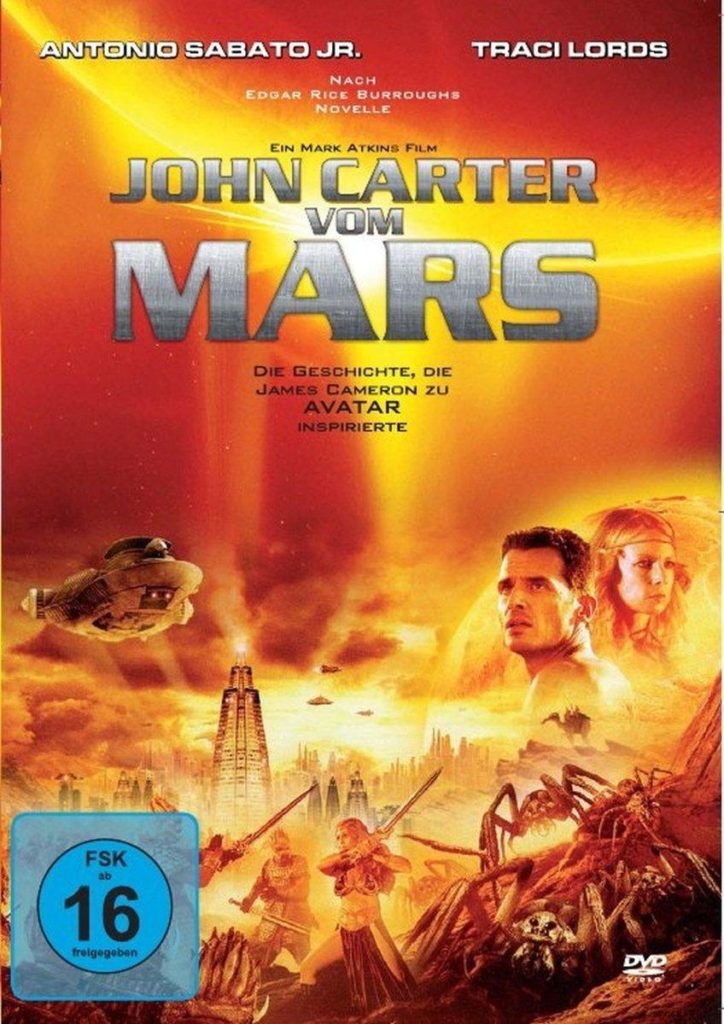
(10) TODAY’S BIRTHDAYS.
[Compiled by Cat Eldridge.]
- Born December 29, 1901 — William H Ritt. US cartoonist and author, whose best known strip, Brick Bradford, was SF. Two of the early Thirties strips, Brick Bradford and the City Beneath the Sea and Brick Bradford with Brocco the Mountain Buccaneer, became Big Little books. in 1947, Brick Bradford, a 15-chapter serial film starring Kane Richmond, was produced by Columbia Pictures. (Died 1972.)
- Born December 29, 1912 — Ward Hawkins. Alternative universes! Lizard men as sidekicks! He wrote the Borg and Guss series (Red Flaming Burning, Sword of Fire, Blaze of Wrath and Torch of Fear) which as it features these I really would like to hear as audiobooks. Not that it’s likely as I see he’s not made it even to the digital book realm yet. (Died 1990.)
- Born December 29, 1928 — Bernard Cribbins, 91. He has the odd distinction of first showing up on Doctor Who in the non-canon Daleks’ Invasion Earth 2150 A.D. film (with Peter Cushing movie as The Doctor.) He would make it into canon when he appeared as Wilfred Mott in the Tenth Doctor story, “Voyage of the Damned”, and he‘s a Tenth Doctor companion himself in “The End of Time”, the two-part 2009–10 Christmas and New Year special.
- Born December 29, 1949 — Ian Livingstone, 70. Co-founder of Game Workshop whose flagship products are are Warhammer Age of Sigmar and Warhammer 40,000. (Have I mentioned that Game Workshop has local shops where fans can buy their unpainted miniatures and other goodies?) He was the first Editor of White Dwarf which, yes, I read a long time ago.
- Born December 29, 1963 — Dave McKean, 56. If you read nothing else involving him, do read the work done by him and Gaiman called The Tragical Comedy or Comical Tragedy of Mr Punch: A Romance. Brilliant, violent, horrifying. Well, and Signal to Noise by them is worth chasing down as well.
- Born December 29, 1966 — Alexandra Kamp, 53. Did you know Sax Rohmer’s novels were made into a film? I didn’t. Well, she was the lead in Sax Rohmer’s Sumuru which Michael Shanks also shows up in. She’d also be in 2001: A Space Travesty with Leslie Neilsen, and Dracula 3000 with Caspar van Dien. Neither will be mistaken for quality films.
- Born December 29, 1972 — Jude Law, 47. I think his first SF role was as Jerome Eugene Morrow In Gattaca followed by playing Gigolo Joe in A.I., with my fav role for him being the title role in Sky Captain and the World of Tomorrow. He was Lemony Snicket In Lemony Snicket’s A Series of Unfortunate Events, Tony in The Imaginarium of Doctor Parnassus, Dr. John Watson in Sherlock Holmes and Sherlock Holmes: A Game of Shadows, Remy In Repo Man and he voiced Pitch Black in one of my favorite animated films, Rise of the Guardians.
(11) FIRST IMPRESSIONS. ComicBook.com invites us to “Star Wars: Watch Mark Hamill’s Perfect Harrison Ford Impression”, rendered during an appearance on Late Night with Seth Meyers.
(12) TEN YEARS FROM NOW. New York Magazine did a future-themed issue in November included a batch of predictions about 2029 based on the newsmaking events of 2019: “The Weirdness Is Coming A glimpse of the near future as seen through the recent past.”.
Today In 2029…This odd future came into view…
We Will Never Know If a Movie Is a Hit
All of the entertainment we used to consume in more independently quantifiable ways — via TV ratings, box office, album sales — has moved to streaming, where we just have to trust Netflix or Spotify or Apple to tell us how popular it is, and they will almost certainly lie. Netflix occasionally releases random stats about how many people watched something, and they usually strain credibility. In June, it claimed 30.9 million watched a new Adam Sandler movie in its first three days, which would have made it one of the biggest openings in history if it had been released in theaters. And we never know how successful any movie is when it’s released on for-pay VOD (via iTunes, Amazon, or your cable box) because nobody shares any numbers at all, which is strange because streaming is how plenty of non-superhero movies make most of their money now. Obviously, they will know — the producers and stars who benefit. But the public will be living entirely in the dark, never knowing if something is actually a hit or just totally Astroturfed. This will be really disorienting; today, at least, the popularity of an artist accounts for like half of the way we feel about them. And hard audience figures were, for a generation of barroom debaters about pop culture, the closest thing anyone actually ever got to a “fact.” —Lane Brown
(13) OBAMA’S 2019 PICKS. “Barack Obama Lists His Favorite Films And Television Shows For 2019” – Deadline has the story.
Former President Barack Obama is making a list, and checking it twice. A day after he released the list of his favorite books of 2019, he’s issued a film/TV faves ledger, including one of his own creations….
(14) NOT BEWITCHED. Eneasz Brodski pans a new show in “The Witcher, Episode 1: A Festivus Airing of Greivances” at Death Is Bad.
I saw the first episode of The Witcher on Festivus, and boy did that unintentionally fit the holiday theme. tldr is that the writers are just phoning this in, and hoping the strength of the fight choreography will keep people watching.
Full Spoilers below.
(15) ROVER COME OVER. LAist reveals, “We Got A Sneak Peek At JPL’s Mars 2020 Rover Before It Heads To Its Launch Site, And It’s Rad”. Photos at the link.
… On Friday, JPL gave a rare media tour to show off the interplanetary robotic vehicle to reporters inside a meticulous dust, hair and oil-free “clean room.” It’s the last time it will be viewed before it’s shipped off to Florida for its July liftoff.
That meant this reporter had to don a full body “bunny” suit and take an air bath with jets to blow away any wayward dust or hair left on the suit.
It took a lot of time and trouble, but NASA’s Dave Gruel said it’s crucial to keep the rover from getting contaminated.
“It’ll be a real bad day for us in the future if those samples come back from Mars and guess what? They’ve got my whisker in that sample,” Gruel said. “That’ll be bad.”
(16) WITH GREAT POWER COMES MINOR LEAGUE HOCKEY. [Item by Mike Kennedy.] ComicBook.com: “Minor League Hockey Team Suits Up in Spider-Man Uniforms on Stan Lee’s Birthday”.
Today, Saturday December 28, would have been the legendary Stan Lee‘s 97th birthday. To mark the occasion fans all around the world are taking a moment to reflect on and honor the prolific and influential comics figure who was responsible for helping to create many of the most iconic characters in comics history — The X-Men, The Avengers, the Fantastic Four, Dr. Doom, Spider-Man, Iron Man, Doctor Strange, and more. It’s one of those characters that a minor league hockey team is using to help honor Lee on his birthday with special Spider-Man uniforms.
On Twitter on Saturday, the Indy Fuel hockey team shared a photo of their uniforms for the evening’s game against the Kansas City Mavericks. The special jerseys are part of the Fuel’s Marvel Super Hero Night event, which just so happens to land on Lee’s birthday. The team also posted thanking the creator for “creating a pretty awesome universe.” You can check out both posts below.
(17) BIZARRE TOY. Nerdbot wants us to know “Monty Python Black Knight Figure Talks & Has Removable Arms”. If they also make one like this for Gandalf, imagine posing them opposite one another yelling, ”None shall pass, none shall pass!”
[Thanks to Cat Eldridge, JJ, Mike Kennedy, Chip Hitchcock, John King Tarpinian, Michael Toman, Andrew Porter, Dann, Martin Morse Wooster, David Langford, John Hertz, and Rich Lynch for some of these stories. Title credit goes to File 770 contributing editor of the day Dennis Howard – classic faanish reference explained here.]

